黑臉琵鷺全球數量再創新高 惜在港數量持續下降 保護后海灣刻不容緩
由香港觀鳥會統籌的「黑臉琵鷺全球同步普查2020」已於1月17至19日順利完成,普查結果是黑臉琵鷺有紀錄以來最高,達4,864隻,較去年上升9%,即增加了401隻,亦是過去五年來,四度錄得創紀錄的新數字。然而,在全球黑臉琵鷺大幅增加的同時,在香港棲息的黑臉琵鷺數量卻顯著下降,今年在后海灣(包括香港及深圳)錄得361隻,相較2010年錄得462隻,減少22%,按年下跌1.4%,顯示后海灣濕地生境的素質正在惡化,估計適合黑臉琵鷺的食物減少,保護后海灣生境刻不容緩。
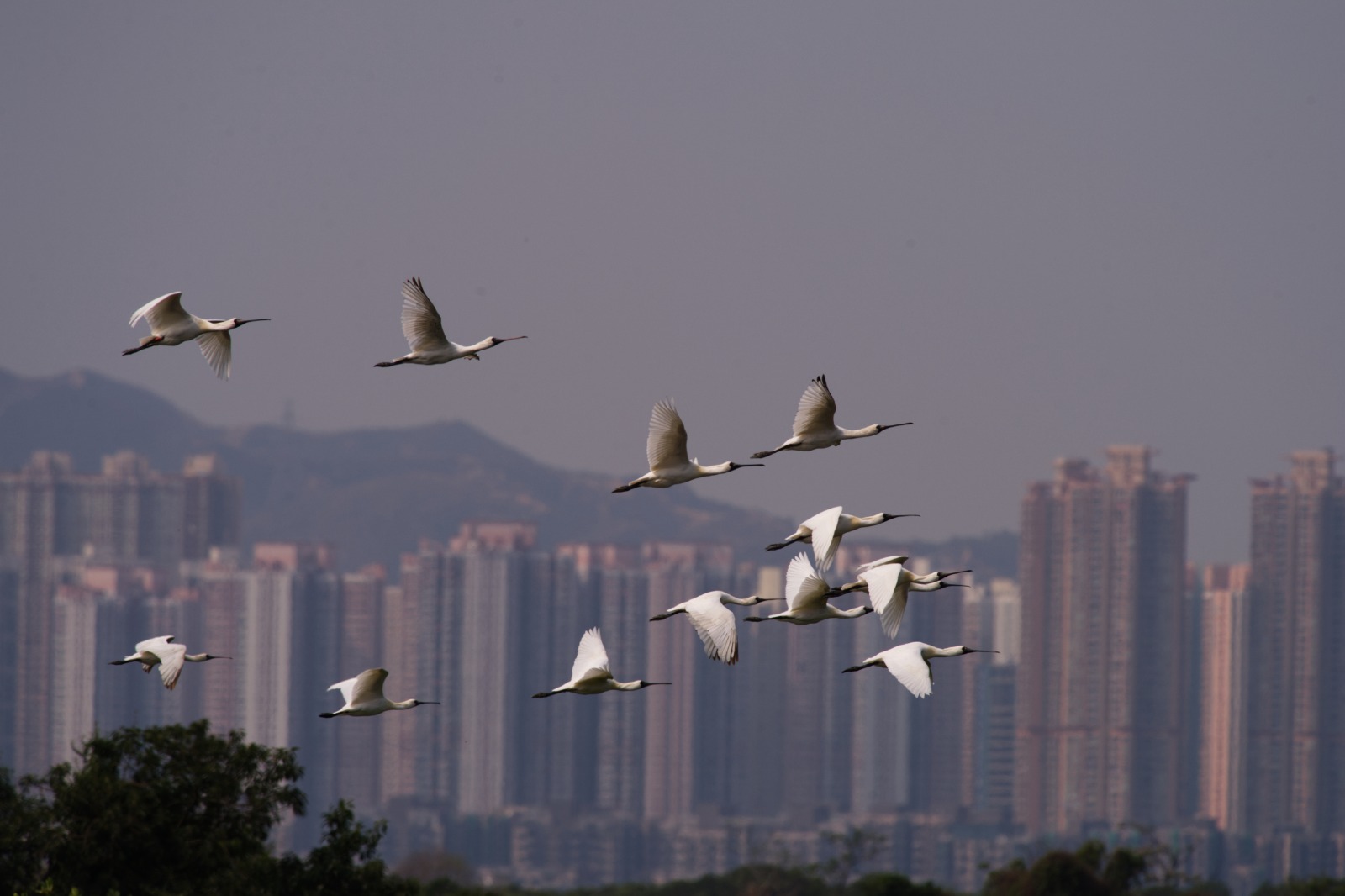
©Evans Leung
黑臉琵鷺再創新高 數目持續穩定上升
黑臉琵鷺全球同步普查自1994年起首次舉行至今,調查覆蓋全球超過120個地點。綜合過去20多年的數據,顯示黑臉琵鷺的數目正持續及穩定地上升。香港觀鳥會研究經理余日東說:「全球黑臉琵鷺再創新高是個大喜訊,已是過去五年第四次破紀錄。黑臉琵鷺於日本、台灣及中國大陸都錄得顯著升幅,反映今年錄得的增幅並非發生在個別地方,而是整體數量的增加。然而,我們不能鬆懈,因為黑臉琵鷺的棲息地正面臨威脅。」其中,台灣及中國大陸錄得顯著升幅,相比2019年數據,分別上升15.7%及4.4%。全球有超過半數的黑臉琵鷺於台灣度冬,數字亦達新高共有2,785隻,佔總體57.4%。然而,后海灣(包括香港及深圳)、澳門及越南紅河的數量卻明顯下降;當中后海灣的黑臉琵鷺較去年下降5.7%。
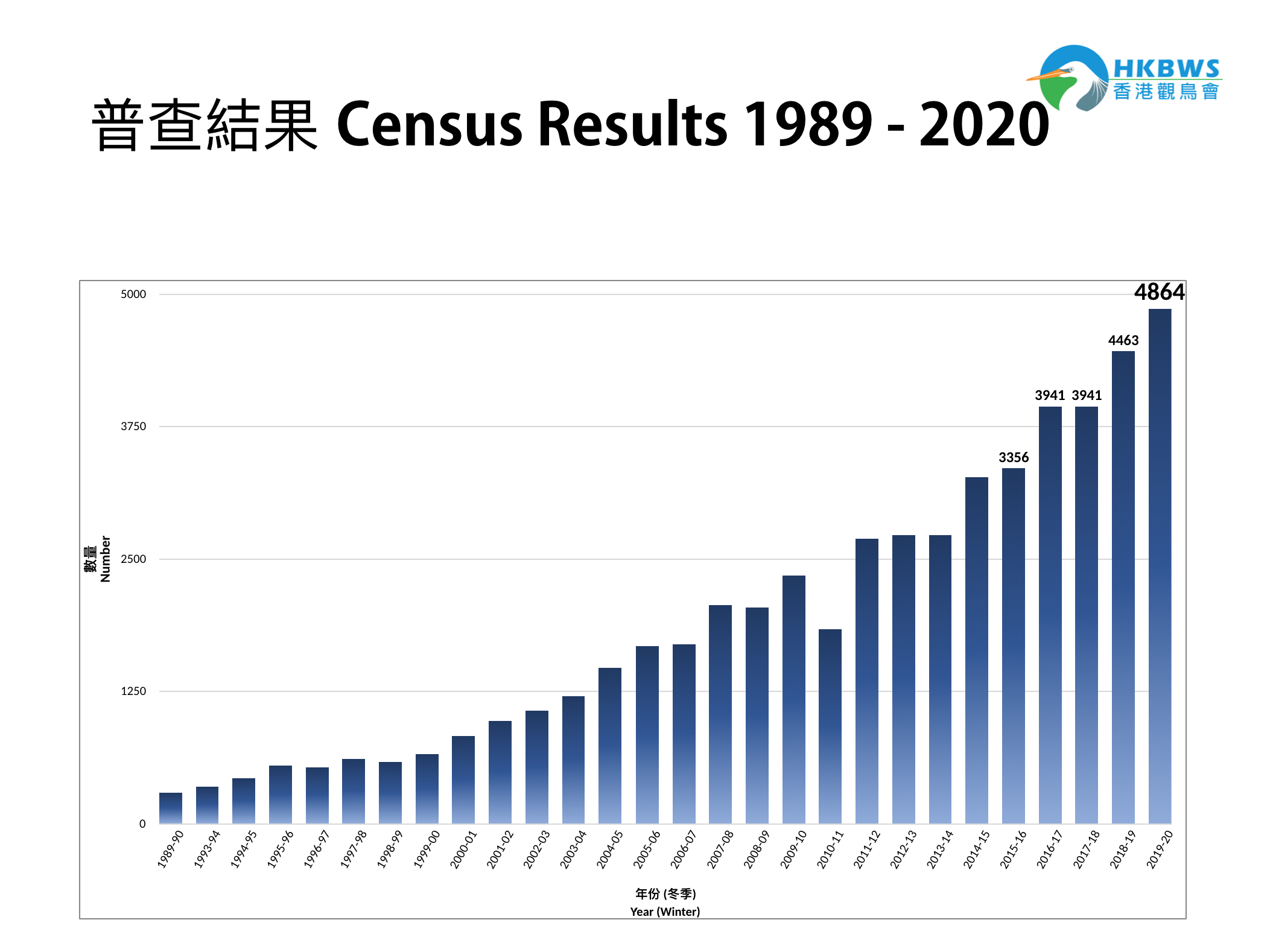 后海灣數量較十年前下降 保護后海灣刻不容緩
后海灣數量較十年前下降 保護后海灣刻不容緩
檢視過去十年的數據,余日東指出:「后海灣的環境素質下降令人十分擔心,數據顯示,正當全球黑臉琵鷺的數量穩定上升時,后海灣的黑臉琵鷺較十年前少22%,整體呈下降趨勢,顯示后海灣的濕地環境惡化,估計適合黑臉琵鷺的食物減少,促使他們不選擇來港棲息。」不單止后海灣,澳門的黑臉琵鷺亦錄得下降。假若大灣區城市發展持續,沿岸環境由泥灘濕地變為城市,適合黑臉琵鷺的泥灘生境將更趨減少,黑臉琵鷺或許在后海灣及澳門消失,故此保護現時后海灣泥灘及魚塘刻不容緩。
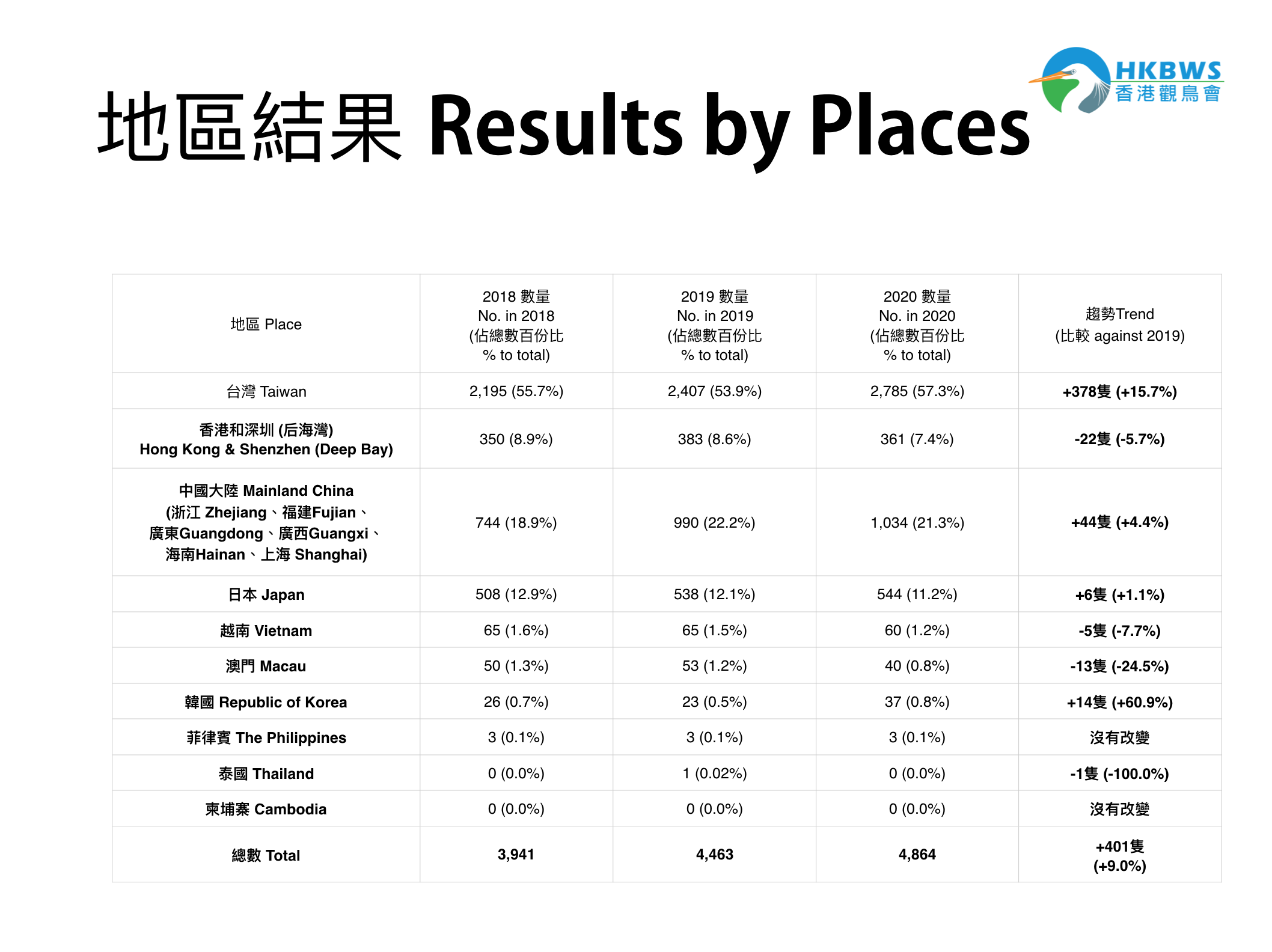
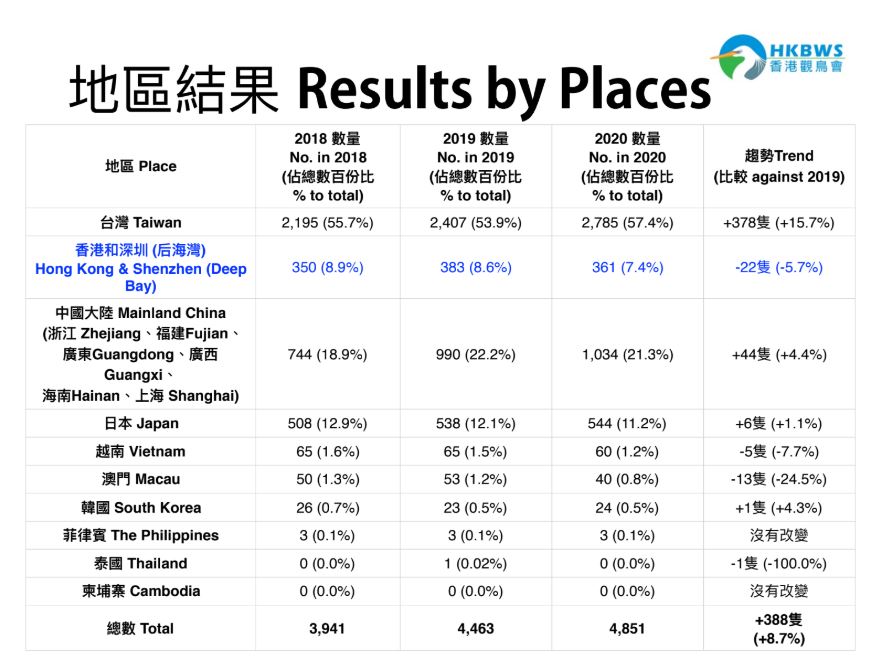
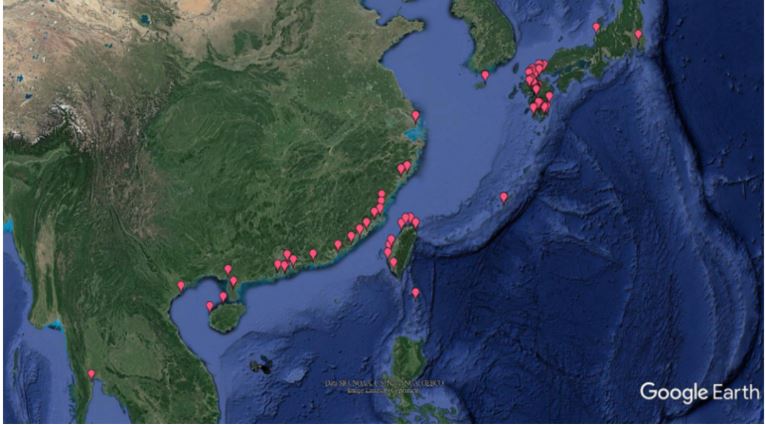
普查地點
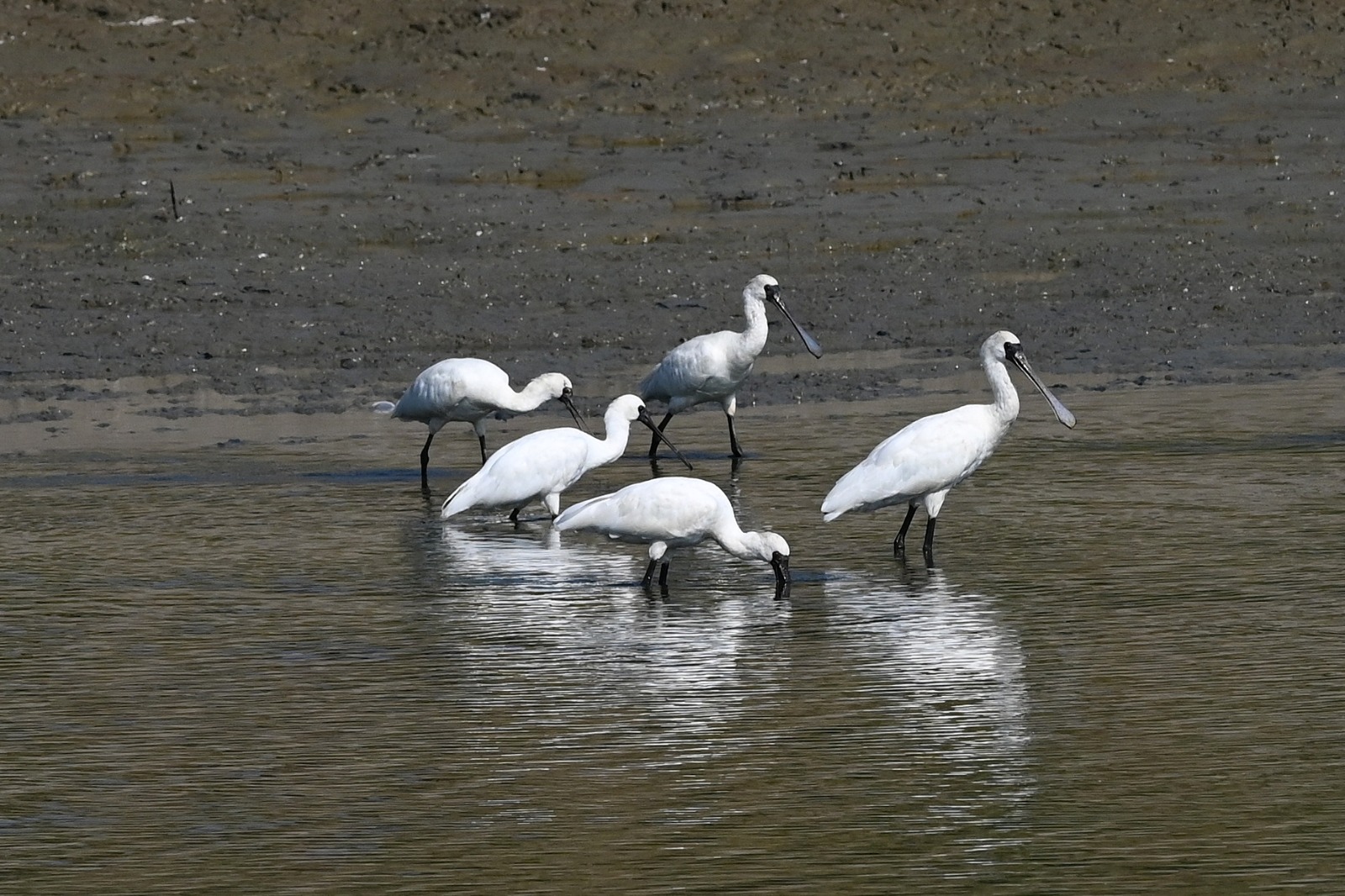
© WK Cheng
維持后海灣魚塘運作 保育全球瀕危黑臉琵鷺
面對后海灣濕地生境惡化,提升魚塘生態承載力是長遠的保育策略之一。魚塘是黑臉琵鷺喜愛的濕地生境之一,在數量上升的中國大陸,大部份黑臉琵鷺都在魚塘找到,包括福建、浙江及廣東的魚塘;而黑臉琵鷺主要的度冬地台灣,絕大部份棲息於台南的魚塘,顯示維持魚塘的運作能有助保育全球瀕危的黑臉琵鷺,需要長遠維持及增加后海灣魚塘保育工作,以增加香港后海灣黑臉琵鷺的承載量。除了原來已於魚塘實行7年的香港魚塘生態保育計劃,香港觀鳥會建議應增加主動的保育措施保持后海灣一帶魚塘的完整性,特別是維持傳統的養殖運作。例如政府應審慎地批核魚塘區的發展計劃,市民可以更積極支持本地魚塘的水產,長遠有效地增加后海灣的黑臉琵鷺承載量。
發佈會錄影:
https://www.youtube.com/watch?v=OPIK35cH39s&
---
*9/4/2020更新:
有資料更新,新增韓國13隻一共有4,864隻
Black-faced Spoonbill population hits record high
Number in HK continues to decline Protection of Deep Bay in urgent need
The Hong Kong Bird Watching Society (HKBWS) coordinated The International Black-faced Spoonbill Census 2020 from 17th to 19th January. During the 2020 Census, 4,864 Black-faced Spoonbills (BFSs) were recorded, which is an 9% increase (i.e., 401 individuals) compared to that of last year. This is a new record high and the fourth time to hit a new high in the past five years. However, a decreasing trend of BFSs was noted at Deep Bay (including Hong Kong and Shenzhen side). The BFS population at Deep Bay dropped at an annual rate of 1.4% in the past decade. Compared with the record of 462 individuals in 2010, the record this year was only 361 individuals, which was 22% less. The decrease indicates that the quality of wetland habitats in Deep Bay is deteriorating and there is less food supply for BFSs. Conservation of Deep Bay habitats is, no doubt, in urgent need.
Population hits record high Steady rise in population
The International Black-faced Spoonbill Census has been carried out since 1994, covering more than 120 sites all over the world. It shows that the population of BFSs has been growing steadily over the past 20 years. Mr. Yu Yat-tung, the Research Manager of HKBWS, said: “This is good news that the population hits record high, especially this is the fourth time in the past five years. There is a steady growth in population of BFS, not only in a few places but in most major wintering sites of BFS including Japan, Taiwan, and mainland China. However, we have to keep it up because the habitats of the BFSs are still under threats.” Compared with the 2019 Census, Taiwan and mainland China recorded significant increases of 15.7% and 4.4%, respectively. More than half of the BFS population wintered in Taiwan, and their number reached a new high of 2,785, accounting for 57.4% of the total. However, numbers of BFSs recorded at Deep Bay (including Hong Kong and Shenzhen side), Macau and the Red River Delta in Vietnam show a significant drop compared with last year. Among these, the number of BFSs recorded in Deep Bay decreased by 5.7%.
Number in HK continues to decline Protection of Deep Bay in urgent need
Analyzing data from the past 10 years, Mr. Yu added: “The environmental deterioration of Deep Bay is worrying. The data shows that the global population of BFS is growing steadily, but the number of BFSs in Deep Bay is 22% less than a decade ago. The wetland habitat is deteriorating and the food available for BFSs is declining, which prompts them not to stay and winter in HK.” The number of BFSs in Macau also recorded a decline. If the urban development of the Bay Area continues and the coastal environment changes from mudflat to cities, the habitat available for BFSs will be further reduced and BFSs may eventually disappear from Deep Bay and Macau. Therefore, there is an acute and urgent need to take more concerted efforts to conserve existing mudflats and fishponds in Deep Bay.
Maintaining fishpond operation to protect the endangered Black-faced Spoonbills
In order to tackle further environmental deterioration of Deep Bay, one of the feasible long-term conservation strategies is to increase the carrying capacity of existing fishponds. Fishponds are one of the preferred habitats for BFSs. Mainland China recorded significant increases of BFSs and most of them are found in fishponds in Fujian, Zhejiang and Guangdong. In Taiwan, the main wintering site of BFSs, most of them inhabited at fishponds in Tainan. It shows that maintaining fishpond operations can help conserve the endangered BFSs. In order to increase the carrying capacity of Deep Bay for BFS, it is essential to have long-term preservation and enhancement measures for fishponds in Deep Bay. In addition to the Hong Kong Fishpond Conservation Scheme operating since 2012, HKBWS has recommended a proactive conservation policy to maintain both the traditional fish farming operations and the integrity of fishpond habitat. In particular, the government should take extra caution with every development submission in Deep Bay and the potential implications on BFS conservation. Mr. Yu recommends that the public can help with the long-term BFS conservation by supporting local fishponds and buying local freshwater fishes!”
Press conference video:
https://www.youtube.com/watch?v=OPIK35cH39s&
*9/4/2020 Update:
Update 13 more from Republic of Korea, the result is 4,864 in total.


